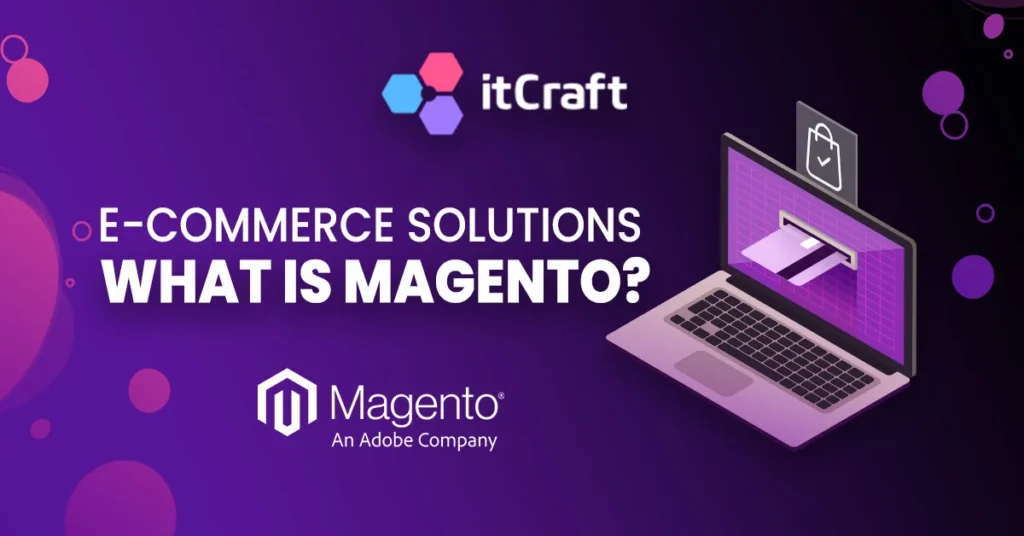
Magento eCommerce Solutions: Empowering Your Online Business
In the rapidly evolving world of eCommerce, having a robust and flexible platform is essential for success. Magento, a powerful open-source eCommerce platform, has emerged as a leading solution for businesses of all sizes looking to build and manage their online stores. This article explores the various Magento eCommerce solutions, their features, benefits, and how they can empower your online business to thrive in a competitive marketplace.
What is Magento?
Magento is an open-source eCommerce platform that provides a feature-rich environment for building online stores. Launched in 2008, it has gained popularity among developers and businesses alike due to its flexibility, scalability, and extensive customization options. Magento offers two primary versions: Magento Open Source (formerly Community Edition) and Magento Commerce (formerly Enterprise Edition).
Magento Open Source
Magento Open Source is free to download and use, making it an attractive option for startups and small businesses. While it requires some technical knowledge to set up and customize, it provides users with a wide array of features, including product management, customer management, and various promotional tools.
Magento Commerce
Magento Commerce is a paid version that offers advanced features, including cloud hosting, additional security options, and dedicated support. It’s designed for larger businesses that require more robust capabilities to manage high-volume transactions and complex product catalogs.
Key Features of Magento eCommerce Solutions
Magento provides an extensive set of features that cater to the diverse needs of eCommerce businesses. Here are some of the key features that make Magento a preferred choice:
1. Customizable and Flexible Architecture
One of Magento’s greatest strengths is its flexibility. Businesses can customize their online stores to align with their unique branding, customer experience, and product offerings. The platform supports a vast library of extensions and themes, enabling users to enhance functionality without starting from scratch.
2. Mobile-Optimized Design
With the increasing use of mobile devices for online shopping, having a mobile-optimized website is crucial. Magento provides responsive design options, ensuring that your store looks great and functions smoothly on any device. This mobile-first approach can significantly improve user experience and conversion rates.
3. Advanced SEO Capabilities
Magento is built with SEO in mind, providing businesses with the tools they need to enhance their online visibility. Features such as customizable URLs, meta tags, sitemaps, and rich snippets help improve search engine rankings. This makes it easier for potential customers to find your store online.
4. Powerful Product Management
Managing a diverse product catalog can be challenging, but Magento simplifies this process. Users can easily add, update, and manage products, including complex products with multiple attributes and variations. Additionally, Magento supports bulk product import/export, saving time for store owners.
5. Secure Payment and Checkout Options
Security is paramount in eCommerce, and Magento offers various built-in security features to protect customer data. It supports multiple payment gateways, including PayPal, Stripe, and credit cards, ensuring that customers can complete transactions securely. The platform also complies with PCI DSS (Payment Card Industry Data Security Standard) to safeguard sensitive information.
6. Robust Analytics and Reporting Tools
To make informed business decisions, it’s essential to have access to accurate data. Magento provides comprehensive analytics and reporting tools that allow store owners to track sales performance, customer behavior, and inventory levels. This data-driven approach helps businesses optimize their strategies for better results.
7. Multi-Store Capabilities
For businesses with multiple brands or product lines, Magento’s multi-store functionality allows users to manage multiple stores from a single admin panel. This feature simplifies management and enables businesses to maintain a consistent brand experience across various platforms.
Benefits of Using Magento eCommerce Solutions
Choosing Magento as your eCommerce platform comes with several benefits that can significantly impact your business’s success:
1. Scalability
As your business grows, your eCommerce platform should be able to keep up. Magento is designed to scale with your business, accommodating increased traffic, product listings, and transactions without sacrificing performance. This makes it an ideal choice for startups looking to expand into larger markets.
2. Community Support and Resources
Being an open-source platform, Magento has a vast community of developers, designers, and users who contribute to its ongoing improvement. This community provides access to forums, tutorials, and resources that can help you troubleshoot issues and enhance your store’s functionality.
3. Enhanced Customer Experience
Magento’s focus on user experience ensures that customers have a seamless shopping journey. Features such as personalized product recommendations, streamlined checkout processes, and user-friendly navigation contribute to higher customer satisfaction and increased conversions.
4. Cost-Effective Solution
While Magento Commerce requires a subscription fee, Magento Open Source is free, making it a cost-effective solution for small businesses. Additionally, the ability to customize and extend the platform means that businesses can tailor their online store without significant upfront costs.
5. Third-Party Integration
Magento seamlessly integrates with various third-party applications and services, such as inventory management, CRM systems, and marketing tools. This flexibility allows businesses to create a comprehensive eCommerce ecosystem that streamlines operations and enhances productivity.
Getting Started with Magento eCommerce Solutions
To begin your journey with Magento, follow these steps:
1. Choose the Right Version
Determine whether Magento Open Source or Magento Commerce is the best fit for your business needs and budget. For startups, the open-source version may be sufficient, while larger businesses may benefit from the advanced features of Magento Commerce.
2. Find a Reliable Hosting Provider
Selecting a reliable hosting provider is crucial for the performance of your Magento store. Look for a provider that specializes in eCommerce hosting and offers features such as fast loading times, robust security, and excellent customer support.
3. Install and Configure Magento
Once you’ve chosen your version and hosting provider, you can install Magento. The installation process is straightforward, and numerous tutorials are available to guide you through the setup. After installation, customize your store’s design, add products, and configure payment options.
4. Optimize for SEO
To ensure your store ranks well in search engines, optimize your site for SEO. This includes setting up meta tags, creating a sitemap, and optimizing product descriptions. Magento’s built-in SEO tools can help you improve your site’s visibility.
5. Launch and Market Your Store
After configuring your store and optimizing it for SEO, it’s time to launch. Promote your online store through various channels, such as social media, email marketing, and paid advertising, to attract customers and drive sales.
6. Monitor Performance and Make Adjustments
Once your store is live, continuously monitor its performance using Magento’s analytics tools. Pay attention to customer behavior, sales data, and inventory levels. Use this information to make data-driven adjustments to your marketing strategies and store operations.
Magento Extensions to Enhance Your eCommerce Store
Magento’s extensive library of extensions allows businesses to add new features and functionality to their online stores easily. Here are some popular extensions that can enhance your Magento eCommerce solution:
1. Magento 2 SEO Extension
Improve your store’s SEO capabilities with a dedicated SEO extension. These extensions provide advanced tools for optimizing your product pages, creating sitemaps, and managing meta tags, helping to boost your search engine rankings.
2. Magento 2 One-Step Checkout
Simplify the checkout process for your customers with a one-step checkout extension. This extension streamlines the checkout experience, reducing cart abandonment rates and improving conversion rates.
3. Magento 2 Customer Reviews Extension
Encourage customer feedback and build trust with a customer reviews extension. This extension allows customers to leave reviews and ratings on your products, which can influence purchasing decisions and improve credibility.
4. Magento 2 Social Media Integration
Enhance your marketing efforts by integrating social media with your Magento store. This extension allows you to share products on social platforms and enables social login for customers, making it easier for them to register and log in.
5. Magento 2 Email Marketing Integration
Integrate your email marketing platform with your Magento store to streamline your marketing efforts. This extension enables you to create targeted email campaigns, automate follow-ups, and track the performance of your email marketing efforts.
Conclusion
Magento eCommerce solutions provide businesses with the tools they need to succeed in the competitive online marketplace. With its robust features, scalability, and flexibility, Magento empowers businesses to create customized online stores that cater to their unique needs. Whether you are a startup or an established enterprise, investing in Magento can lead to increased sales, improved customer satisfaction, and sustainable growth.
If you’re considering Magento for your eCommerce business, now is the time to take action. Explore the different versions, find the right hosting provider, and start building your online store today. With Magento by your side, the possibilities for your eCommerce success are endless.
FAQs
1. Is Magento suitable for small businesses?
Yes, Magento Open Source is a cost-effective option for small businesses looking to establish an online presence. It provides essential eCommerce features and can be customized to meet specific needs.
2. What are the system requirements for Magento?
Magento requires a compatible web server (Apache or Nginx), PHP (7.3 or later), MySQL (5.6 or later), and other components such as Redis and Elasticsearch for optimal performance.
3. How secure is Magento?
Magento is designed with security in mind, offering features such as PCI compliance, built-in security patches, and support for SSL certificates to protect customer data.
4. Can I migrate my existing store to Magento?
Yes, Magento provides tools and resources to help businesses migrate their existing stores from other platforms. It’s advisable to work with experienced developers for a seamless migration process.
5. How can I improve my Magento store’s performance?
You can enhance your Magento store’s performance by optimizing images, utilizing caching
